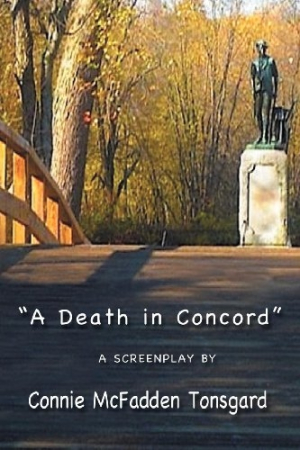A Death in Concord
Connie Mcfadden Tonsgard has been a finalist in nearly twenty screenplay contests, including those sponsored by the Screenplay Festival and StoryPros. Her new screenplay, A Death in Concord, has the pace, energy, and twists and turns of a James Patterson novel. Its characters, dialogue, story, and minimal directorial instructions would translate well from script to screen as a suspense film—tinged with chick-flick elements—that aims for the thirty- to forty-year-old demographic.
The opening scene features, Dan Marsh, a pompous, high-powered lawyer on trial for murder. The prosecuting attorney describes the case against Marsh, telling the jury, “you will hear about love, greed and the ultimate betrayal.” The screenplay then jumps back in time six months, where Rose, Dan’s wife, is preparing for a party at their luxurious home. Readers learn that Dan plans to adopt Rose’s biological teenage daughter, Tigerlily. Estranged and lonely, Rose thinks that Dan is neglectful as a father and husband and suspects him of having an affair.
Rose uncovers a nefarious plot against her when she discovers the truth about Tigerlily’s death in what seemed like a bicycle accident. The dynamics among characters are not quite what they seem. Rose battles a hired killer in a cat-and-mouse scene as intense and realistic as some moments in Sam Peckinpah’s movie Straw Dogs. Dialogue is crisp and natural, with information disclosed through actions rather than clumsy exposition. Tonsgard dives right into the guts of a scene, avoiding the amateurish mistake of revealing too much too quickly.
Adroit writing creates layers of mystery between lines of script and camera shots—like a play in which important events occur offstage in the audience’s imagination and along the fringes of their collective unconscious. Beginning with moonlight glistening off the Atlantic Ocean, Tonsgard writes, “A form breaks the waves. WOOSH of breath and mist from the blow hole of a marine mammal.” An exterior night shot with the ocean spraying up against rocks next to a lighthouse on Cape Cod is written vividly. The description of the final introductory scenes containing fog or mist, evoke an underlying mood of fear and dread.
Tonsgard has both a writer’s and a director’s eye. A Death in Concord confirms that love, murder, and greed—the best and worst of human nature—permeate all layers of society.
Reviewed by
Lee Gooden
Disclosure: This article is not an endorsement, but a review. The publisher of this book provided free copies of the book and paid a small fee to have their book reviewed by a professional reviewer. Foreword Reviews and Clarion Reviews make no guarantee that the publisher will receive a positive review. Foreword Magazine, Inc. is disclosing this in accordance with the Federal Trade Commission’s 16 CFR, Part 255.

